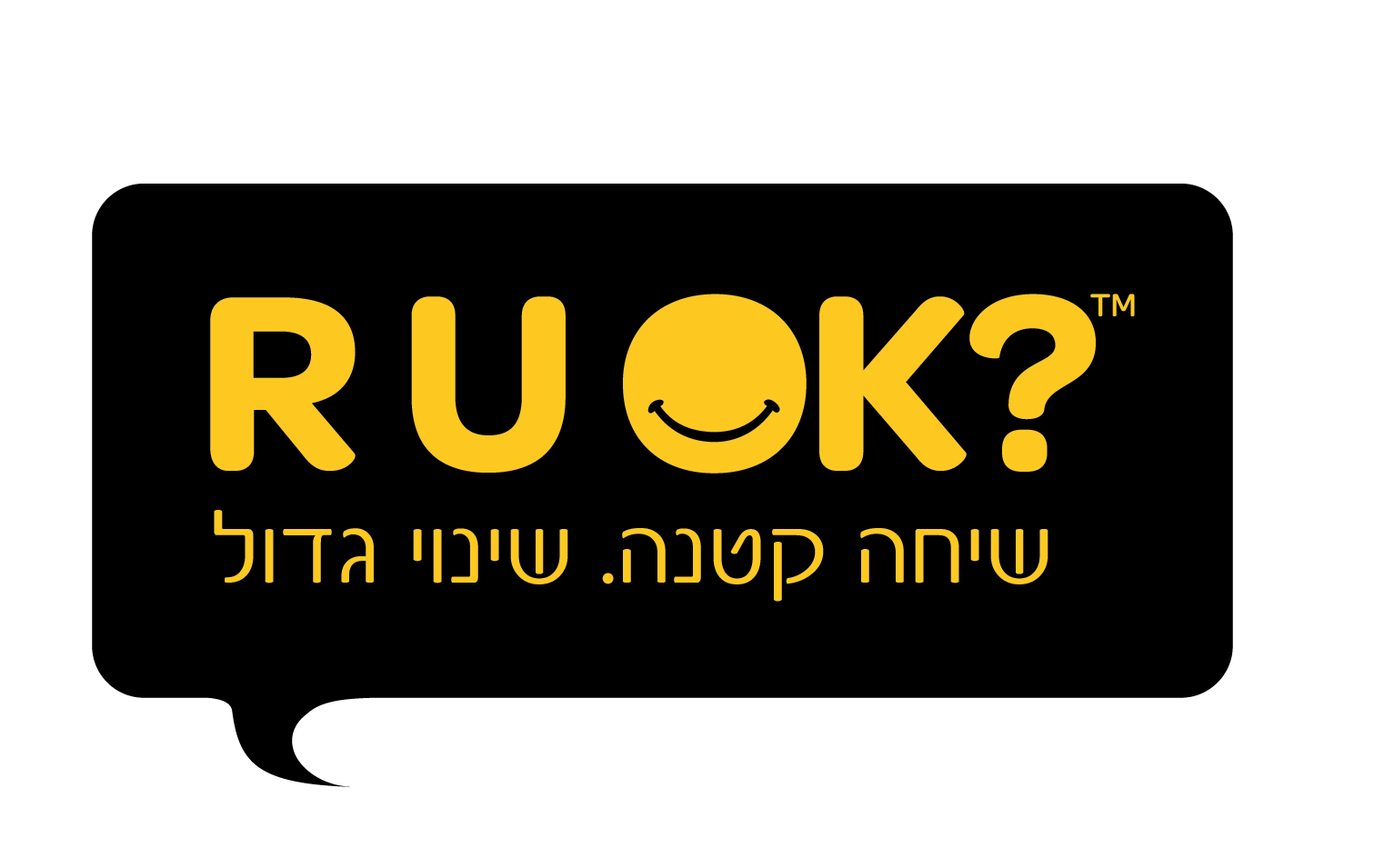Take the first step. Show you truly care
In challenging times like these, recognising signs of distress and offering genuine care can make all the difference. So how do you ask, “How are you?” when it’s clear many of us are not okay?
R U OK? is a project led by Enosh, the Israeli Mental Health Association. It is designed to help us identify those in need, show real concern, and create meaningful change.
With R U OK? we can make a difference in the well-being of those around us – helping them navigate tough times, cope with crises, and, in extreme cases, even prevent suicide.
A conversation could change a life.
We often hesitate, unsure of what to say or fearful of the response. But one doesn’t need to be an expert to help. What matters most is being attentive, caring, and genuinely interested.
So, what is R U OK?
R U OK? is a social enterprise founded in Australia in 2009 with a mission to drive social change, normalize conversations about mental health, and raise awareness about supporting those around us.
You can make a real difference by using simple yet powerful tools such as a conversation, listening without judgment, encouraging action, and staying in touch.
Take the first step. Show you truly care
?How to Ask R U OK




After listening, encourage them to consider steps they can take to improve their situation.
- Ask empowering questions:
- “What has helped you in similar situations before?”
- “What can you do for yourself right now that might make you feel better?”
- “How can I support you?”
- Suggest self-care activities: Encourage daily actions they find enjoyable or grounding, whether it’s exercising, journaling, seeing friends, or watching a favourite movie.
- Consider professional support: If the issue seems ongoing or severe, suggest talking to a professional:
- “Have you thought about seeing a counselor or therapist?”
- “Would you like help finding someone to talk to?”
If you believe they are at risk of self-harm or harming others, seek immediate professional assistance:
- For urgent help in Israel: Call ERAN at 1201 or dial 100 for the police.
- For non-emergencies, contact the Enosh information line at *5873.
Checking in once is helpful, but ongoing support can make a lasting impact.
- Follow up in a few days: Set a reminder to reach out again.
- “I’ve been thinking about you. How have you been since we last talked?”
- “Did you find a way to deal with what you were feeling?”
- Be patient if progress is slow: Even if they haven’t taken action or improved, your consistent care matters. Sometimes, simply knowing someone is there is enough.
The Key is Connection
Asking R U OK? is about showing genuine care and reminding someone they’re not alone. Your willingness to listen, without judgment or pressure, can make a world of difference.
Do you feel like someone you know isn’t quite themselves? Perhaps they seem upset, withdrawn, or just different from usual. If so, it’s time to check in.
- Pick the right moment: Choose a time when you can give your full attention, and when both of you are free from distractions.
- Start small and personal: Begin with open-ended questions like:
- “What’s new with you?”
- “How have you been lately?”
- “How are you feeling today?”
- Reference your observations:
- “You’ve been quieter than usual – everything okay?”
- “I haven’t seen you jogging the past few weekends. How are you?”
- “You seemed a bit off during lunch yesterday; I’ve been thinking about you.”
- Respect their choice to share or not: If they’re not ready to talk, reassure them:
- “That’s okay. Just know I’m here if you ever want to chat.”
- “If you don’t feel comfortable talking to me, I hope you’ll talk to someone you trust.”
Once they start sharing, your role is to listen attentively and without judgment.
- Be open and non-judgmental: Avoid criticism, and don’t minimize their feelings. Even if the issue doesn’t seem serious to you, it might feel overwhelming to them.
- Acknowledge their emotions: Use validating phrases like:
- “That sounds really tough.”
- “I can see why this feels so hard right now.”
- “It’s completely normal to feel that way in this situation.”
- Encourage them to share more:
- “How long have you been feeling like this?”
- “What’s been the hardest part for you?”
- Reflect and clarify: Summarise what they’ve said to show you’re listening:
- “It sounds like the stress at work is affecting your personal life. Is that right?”
Be patient: Give them time to think and speak, even if there are pauses or silences.
Do you feel like someone you know isn’t quite themselves? Perhaps they seem upset, withdrawn, or just different from usual. If so, it’s time to check in.
- Pick the right moment: Choose a time when you can give your full attention, and when both of you are free from distractions.
- Start small and personal: Begin with open-ended questions like:
- “What’s new with you?”
- “How have you been lately?”
- “How are you feeling today?”
- Reference your observations:
- “You’ve been quieter than usual – everything okay?”
- “I haven’t seen you jogging the past few weekends. How are you?”
- “You seemed a bit off during lunch yesterday; I’ve been thinking about you.”
- Respect their choice to share or not: If they’re not ready to talk, reassure them:
- “That’s okay. Just know I’m here if you ever want to chat.”
- “If you don’t feel comfortable talking to me, I hope you’ll talk to someone you trust.”
Once they start sharing, your role is to listen attentively and without judgment.
- Be open and non-judgmental: Avoid criticism, and don’t minimize their feelings. Even if the issue doesn’t seem serious to you, it might feel overwhelming to them.
- Acknowledge their emotions: Use validating phrases like:
- “That sounds really tough.”
- “I can see why this feels so hard right now.”
- “It’s completely normal to feel that way in this situation.”
- Encourage them to share more:
- “How long have you been feeling like this?”
- “What’s been the hardest part for you?”
- Reflect and clarify: Summarise what they’ve said to show you’re listening:
- “It sounds like the stress at work is affecting your personal life. Is that right?”
Be patient: Give them time to think and speak, even if there are pauses or silences.
After listening, encourage them to consider steps they can take to improve their situation.
- Ask empowering questions:
- “What has helped you in similar situations before?”
- “What can you do for yourself right now that might make you feel better?”
- “How can I support you?”
- Suggest self-care activities: Encourage daily actions they find enjoyable or grounding, whether it’s exercising, journaling, seeing friends, or watching a favourite movie.
- Consider professional support: If the issue seems ongoing or severe, suggest talking to a professional:
- “Have you thought about seeing a counselor or therapist?”
- “Would you like help finding someone to talk to?”
If you believe they are at risk of self-harm or harming others, seek immediate professional assistance:
- For urgent help in Israel: Call ERAN at 1201 or dial 100 for the police.
- For non-emergencies, contact the Enosh information line at *5873.
Checking in once is helpful, but ongoing support can make a lasting impact.
- Follow up in a few days: Set a reminder to reach out again.
- “I’ve been thinking about you. How have you been since we last talked?”
- “Did you find a way to deal with what you were feeling?”
- Be patient if progress is slow: Even if they haven’t taken action or improved, your consistent care matters. Sometimes, simply knowing someone is there is enough.
The Key is Connection
Asking R U OK? is about showing genuine care and reminding someone they’re not alone. Your willingness to listen, without judgment or pressure, can make a world of difference.
Useful Tools
Who We Are
Enosh is Israel’s leading organisation dedicated to promoting mental health and well-being. We offer a comprehensive range of professional services tailored to support prevention, treatment, and rehabilitation. With a trauma-informed, holistic, and integrative approach, we provide care to individuals experiencing emotional distress or living with mental disabilities, as well as their families.
Our mission extends beyond services: we work tirelessly to ensure rights, disseminate knowledge, raise awareness, and advocate for improved policies in mental health and well-being.
Our Journey
Enosh was founded in 1978 by a group of mothers determined to enhance the quality of life for their children living with mental disabilities. What started as a grassroots initiative has grown into a leading national body recognised for its expertise in mental health. Over the decades, we have:
- Placed mental health at the forefront of public discourse.
- Developed innovative support systems and services.
- Built a trusted reputation as a hub of professional knowledge in the field.
Our Reach
Enosh operates 90 centers nationwide, from the Galilee to Eilat, addressing the unique needs of diverse populations. With the dedication of approximately 1,500 employees and 1,000 volunteers, we ensure accessible support tailored to ever-changing societal and individual needs.
R U OK? in Israel
Israel is the first country outside of Australia to adopt and implement the globally recognised R U OK? project.
At Enosh, we have integrated this life-changing model into Israeli society by conducting workshops in:
- Organisations
- Educational institutions
- Youth movements
In addition to direct training, we engage in advocacy and awareness campaigns to normalise conversations around mental health and empower communities to support one another.
At Enosh, we are committed to creating a society where mental health is understood, supported, and prioritised because every individual deserves to feel seen, heard, and cared for.
The Numbers Speak
Someone in my immediate environment shows interest in my well-being
This interest significantly helps me cope with current realities
I would respond directly to a friend in need
My workplace actively shows interest in my mental health
* A survey conducted by Rushinek Market Research in August 2024 highlights the impact of our efforts during the ongoing challenges of war.
Get in touch

